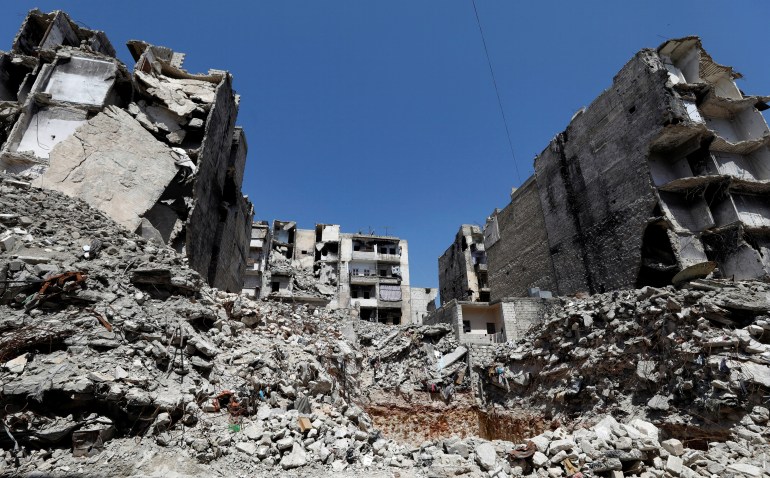Kiev
- Many Ukrainian cities have been killed and destroyed by the Russian war, including residential buildings, infrastructure and vital facilities, hundreds of victims, thousands of injured, and millions of displaced or stranded people.
But the situation in the city of Mariupol, in the southeast of Ukraine, is considered the most tragic, with the continued bombardment of it without stopping from several sides, and the destruction that has affected - so far - about 90% of its area of approximately 166 square kilometers, which is no longer livable, according to its local authorities.
Destruction stopped the city from supplying water, electricity, gas, and heating in the early days of the war that has been going on since February 24, and the siege imposed by the Russian forces on it increased the suffering of hundreds of thousands of residents, who were unable to leave, as did the residents of other cities.
What is the significance of Mariupol?
As Ukraine and Russia trade accusations of responsibility for the city, the focus on them calls into question the importance of Mariupol for both sides.
Administratively, the city belongs to the Donetsk region of Donbass region, which was recognized by Russian President Vladimir Putin - before the start of the war - as an "independent republic". For this reason, the separatists in Donetsk consider the Mariupol battles to be "liberation" battles from the "Ukrainian occupation".
With its commercial port, the city is considered Ukraine's only window to the Sea of Azov today, after separatists and Russian forces took control of other windows, and the neighboring Kherson region, north of Crimea.
Also, the city's territory is considered the only land bridge linking the Russian mainland with Crimea, which was annexed by Russia, and the separatists tried to control it in 2014, but Ukraine expelled them from it at that time.
From the images of destruction in Aleppo, which Ukrainian officials indicated may be repeated in Mariupol (Reuters)
Between Mariupol and Aleppo
The siege of the city, the suffering of the residents, the nature of the bombing, the obstruction of displacement, and the inability of the Red Cross and other organizations to intervene and deliver aid, aspects that European and Ukrainian officials liken to what they witnessed before the Syrian city of Aleppo.
This prompts some Ukrainians - it seems - to consider that "the tragedy imposed twinning between the two cities", instead of the traditional twinning, stemming from the will for cooperation and joint development in times of peace.
In this aspect as well, Ukrainian officials refer to the indiscriminate shelling, and to the throwing of "high explosive" bombs, the last of which was two days ago on a theater in the city, where hundreds of civilians were sheltered, which led to the killing and wounding of "dozens", while searches are still ongoing. About victims and survivors under the rubble.
The European Union foreign policy official, Josep Borrell, said - earlier - that "Russia may resort to destroying Ukrainian cities, as it did in Aleppo."
Ukrainian President Volodymyr Zelensky said that "what is happening in Mariupol is very similar to what Russia did in Syria in general."
And an adviser in the Ukrainian Defense Ministry likened “the fate of Mariupol under Russian bombing to the fate of the city of Aleppo in Syria,” referring to the destruction;
At a time when Ukrainian intelligence confirmed - in fact - the arrival of 150 aides of the Syrian regime to fight alongside Russia against Ukraine, in Mariupol and other cities.
Ukrainian officials confirmed that the nature of the bombing of Mariupol is similar to what was witnessed in the city of Aleppo (Reuters)
Revenge of the "hostage" population
According to Ukrainian officials, the scale of violence that the city is subjected to comes as "retaliation" for the "magnitude of the resistance in it", and from its residents who reject the "Russian occupation", rather than "welcome it".
In this regard, the Ukrainian General Staff asserts that its forces inflicted heavy losses on their Russian counterparts in the city, while recognizing the latter's control of the eastern suburbs.
Deputy Prime Minister of Ukraine Irina Verychuk also confirms that Russia is deliberately holding hundreds of thousands of residents hostage, in retaliation for them, because they prefer to migrate to the rest of Ukraine, rather than move to Russia or lands controlled by Moscow loyalists in the Donbass region.
According to the city administration, the bombing operations have left - so far - more than 3,000 dead, buried in parks and roads in "mass graves", and the number is expected to exceed the 20,000 barrier with the continued bombing and siege.
The past days resulted in the displacement of only about 30,000 residents, with accusations being exchanged against the bombing of safe passages designated for this purpose, which led to the death and injury of a number of displaced people.

